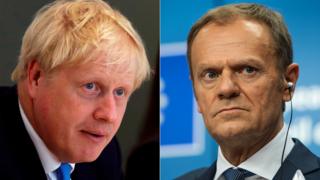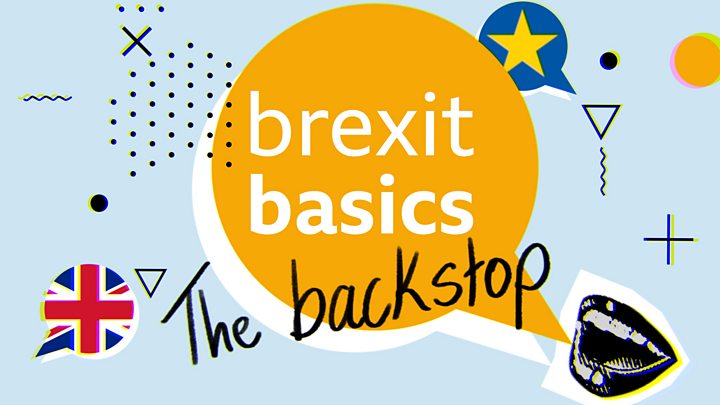Brexit: Boris Johnson calls for ‘anti-democratic’ backstop to be scrapped
 Image copyright Getty Images
Image copyright Getty Images Boris Johnson has told the EU the backstop plan for the Irish border must be scrapped because it is “unviable” and “anti-democratic”.
In a letter to European Council President Donald Tusk, the PM said the backstop – which aims to avoid a hard border – risked undermining the Northern Irish peace process.
If the plan was removed, Mr Johnson claimed a Brexit deal would be passed by parliament.
Brussels has not yet responded.
However, the EU has consistently insisted the backstop must remain part of the withdrawal agreement and cannot be changed.
In a phone conversation with Mr Johnson on Monday evening, Irish Taoiseach (prime minister) Leo Varadkar reiterated that the agreement could not be reopened and the backstop could not change.
The backstop – part of the withdrawal agreement negotiated by former prime minister Theresa May which has been rejected by Parliament three times – is an insurance policy to prevent a hard border in Northern Ireland.
If implemented, it would see Northern Ireland stay aligned to some rules of the EU single market.
In his letter, Mr Johnson described the arrangement as “inconsistent with the sovereignty of the UK” and insisted it could not form part of a withdrawal agreement.
He also warned that it risked “weakening the delicate balance” of the Good Friday peace agreement.

Media playback is unsupported on your device
The prime minister called for “flexible and creative solutions” and “alternative arrangements” – based on technology – to avoid a hard border.
He said the backstop should be replaced with a commitment to put in place such arrangements as far as possible before the end of the transition period – currently the end of 2020 under Mrs May’s deal.
If they were not in place by the end of the transition period, Mr Johnson said the UK was “ready to look constructively and flexibly at what commitments might help”.
“Time is very short. But the UK is ready to move quickly, and, given the degree of common ground already, I hope the EU will be ready to do likewise,” he wrote.
“I am equally confident that Parliament would be able to act rapidly if we were able to reach a satisfactory agreement which did not contain the backstop.”
View from the EU
Those involved with drafting the backstop read and re-read the prime minister’s letter with mounting dread.
It shows that the UK is not committed to a fully worked up – “legally operable” – insurance policy for the Irish border to be contained in the Brexit divorce treaty. That crosses a major EU red line.
Instead Mr Johnson has proposed using the post-Brexit transition period to search for alternative ways of keeping the border open.
If they can’t be found, the UK is committing to having a fall-back option. Yes… something you might call “a backstop.”
A lot of this had been telegraphed to the EU in advance by the prime minister and his advisers but it feels different now it’s on paper.
European diplomats wonder whether they are being asked to sign up to something that is too vague, too difficult to achieve, or just too hard for them to accept.
However, Labour pointed out that Mr Johnson had previously voted for Mrs May’s deal, including the backstop.
“Whichever Brexit outcome he pursues, whether it’s a disastrous no deal or this fantasyland wish list, Boris Johnson clearly has no qualms about putting jobs, rights, prosperity or peace in Northern Ireland at risk,” shadow Northern Ireland secretary Tony Lloyd said.
Labour leader Jeremy Corbyn is calling on the government to publish all documents on the impact of a no-deal Brexit, after a leak at the weekend suggested there could be significant disruption to supplies of food and medicine.
Michael Gove, the cabinet minister responsible for no-deal planning, has said the information in that leaked dossier was old and Brexit planning had accelerated since Mr Johnson became prime minister.
However, Mr Corybn said: “If the government wants to be believed that it doesn’t represent the real impact, it must publish its most recent assessments today in full.”
A government spokesperson said up-to-date information on what businesses and members of the public needed to do to prepare for the UK’s departure from the EU was available on the government’s website.
Mr Johnson has said he wants to reach a deal with the EU but the UK must leave “do or die” by the end of October.
Mr Johnson’s four-page letter to Mr Tusk comes ahead of meetings this week with German Chancellor Angela Merkel and French President Emmanuel Macron.





